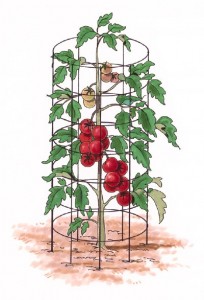Community life competence
Connecting local responses around the world
Connect with us
Website: the-constellation.org
Newsletter English, French Spanish
Facebook https://www.facebook.com/pages/The-Constellation/457271687691239
Twitter @TheConstellati1
Instagram: https://www.instagram.com/constellationclcp/
The Case of the Missing Tomato Cages
I've often said that it was easier for me to move to rural Zimbabwe than to Detroit. When people ask me why this farm-girl-turned-aid-worker devoted myself to placing community-driven development initiatives at the forefront of aid, here’s why:
Word got out, spread, and the situation was quickly resolved (within 12 hours). Whether the culprit chose to return the tomato cages by their own accord, or someone else's urging - does it matter?
What people involved in international assistance often miss is that effective community leaders and nimble grassroots organizations know best how to operate in environments that contain and cultivate strong incentives and mechanisms for person-to-person responsibility and mutual trust. When organizations are embedded in the communities they serve, their expertise lies in knowing just how the tomato cages get back to Lillian.
In the aid context, there is an increasing number of skilled intermediary funders adept at partnering with local groups that demonstrate solid evidence of strong community ownership within their organizational systems. These intermediaries' experience shows that when downward accountability is present, theft and corruption are a rare occurrence at the community level.
So when I hear aid workers say, “there’s too much corruption at the local level” or “grassroots organizations will just abscond with the money”, I wish they knew more about how the tomato cages came back home.
(And yes, Lillian is my grandma, Jr. my grandpa. They still live in my hometown of 248 people.)
***
To read more about how “daily, organic systems of ‘horizontal’ assistance actually function,” I highly recommend reading: Wilkinson-Maposa, S. & Fowler, A. (2009). The poor philanthropist I-IV: How and why the poor help each other. Cape Town: Southern Africa-United States Center for Leadership and Public Values.
***
This post originally appeared at: http://www.how-matters.org/2012/05/07/missing-tomato-cages/
***
Related Posts
Rethinking Trust, by Ben Ramalingam
Reaching Girls at the Grassroots – A Sound Investment (Part 1)
© 2026 Created by Rituu B. Nanda.
Powered by
![]()



You need to be a member of Community life competence to add comments!
Join Community life competence